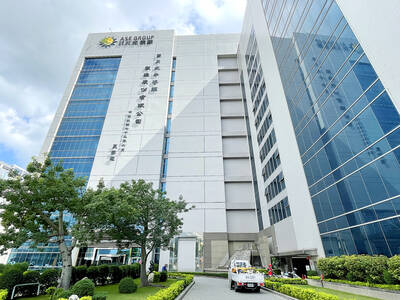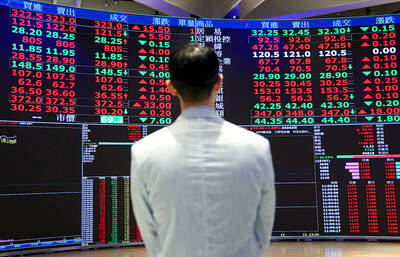Taiwan will end a seven-year run of deficits by reporting a surplus for last year and could balance the budget again this year, Finance Minister Ho Chih-chin (何志欽) said.
The nation had a NT$15.5 billion (US$470 million) surplus last year, Ho said, citing an unaudited figure.
In December, the government forecast a NT$50 billion deficit.
Ho said he is "reasonably confident we will have a balanced budget this year."
Balanced budgets may raise the likelihood of a higher debt rating for Taiwan, which ranks behind Singapore, Japan, Australia and New Zealand and ahead of China.
Last year's surplus was attributed to higher-than-expected tax revenue and income from state companies, reduced spending and asset sales, said Esther Chang, a finance ministry executive officer.
"If Taiwan can continue to balance its budget, its credit profile will improve and the chances of an improved credit rating will accordingly rise," said Jonathan Lee (李信佳), a senior director at Fitch Ratings Ltd in Taipei.
The audited figure for last year may be released this month or next month, the government said.
Fitch has given Taiwan's local-currency debt an AA rating, the third-highest investment-grade classification. Moody's Investors Service rated the debt Aa3, its fourth-highest grade.
Ho's confidence contrasts with this year's budget for a NT$217.1 billion deficit, including debt payments. The budget has not yet been approved by the legislature because of a standoff between the ruling and opposition parties.
Better enforcement of tax collection should help boost revenue this year, Ho said on May 4.
Nevertheless, some economists voiced skepticism about the balanced budgets so far in advance of the 2011 target for eliminating deficits, questioning whether accounting methods have changed.
"If we have a budget surplus, it would be a surprise to me," said Cheng Cheng-mount (
Cheng said he was not optimistic about the likelihood of surpluses because of the finance ministry's goal of cutting taxes.
However, Fitch's Lee said: "The budget surplus is a very good beginning for Taiwan because its budget deficits have been a major factor that has restrained its credit rating."
Increased stock and property transactions and progress in blocking tax avoidance may have boosted revenue last year, Lee said.
Government debt was NT$3.82 trillion last year, or 33 percent of GDP, the finance ministry said.
Ratings company Moody's said a balanced budget would allay debt concerns.
Nevertheless, uncertain relations with China remain the biggest constraint on Taiwan's debt rating, said Thomas Byrne, a senior vice president at Moody's.
"Improving government finances should be supportive of the country's credit rating, but that is not a big issue for the markets," said David Cohen, an economist at Action Economics in Singapore.
The pending elections "are more important for Taiwan's rating because they will affect relations with Beijing," Cohen said.

EXPANSION: The investment came as ASE in July told investors it would accelerate capacity growth to mitigate supply issues, and would boost spending by 16 percent ASE Technology Holding Co (ASE, 日月光投控), the world’s biggest chip assembly and testing service provider, yesterday said it is investing NT$17.6 billion (US$578.6 million) to build a new advanced chip packaging facility in Kaohsiung to cope with fast-growing demand from artificial intelligence (AI), high-performance-computing (HPC) and automotive applications. The new fab, called K18B, is to commence operation in the first quarter of 2028, offering chip-on-wafer-on-substrate (CoWoS) chip packaging and final testing services, ASE said in a statement. The fab is to create 2,000 new jobs upon its completion, ASE said. A wide spectrum of system-level chip packaging technologies would be available at

Taiwan’s foreign exchange reserves hit a record high at the end of last month, surpassing the US$600 billion mark for the first time, the central bank said yesterday. Last month, the country’s foreign exchange reserves rose US$5.51 billion from a month earlier to reach US$602.94 billion due to an increase in returns from the central bank’s portfolio management, the movement of other foreign currencies in the portfolio against the US dollar and the bank’s efforts to smooth the volatility of the New Taiwan dollar. Department of Foreign Exchange Director-General Eugene Tsai (蔡炯民)said a rate cut cycle launched by the US Federal Reserve

HEAVYWEIGHT: The TAIEX ended up 382.67 points, with about 280 of those points contributed by TSMC shares alone, which rose 2.56 percent to close at NT$1,400 Shares in Taiwan broke records at the end of yesterday’s session after contract chipmaker Taiwan Semiconductor Manufacturing Co (TSMC, 台積電) hit a fresh closing-high amid enthusiasm toward artificial intelligence (AI) development, dealers said. The TAIEX ended up 382.67 points, or 1.45 percent, at the day’s high of 26,761.06. Turnover totaled NT$463.09 billion (US$15.22 billion). “The local main board has repeatedly hit new closing highs in the past few sessions as investors continued to embrace high hopes about AI applications, taking cues from a strong showing in shares of US-based AI chip designer Nvidia Corp,” Hua Nan Securities Co (華南永昌證券) analyst Kevin Su

Nvidia Corp’s major server production partner Hon Hai Precision Industry Co (鴻海精密) reported 10.99 percent year-on-year growth in quarterly sales, signaling healthy demand for artificial intelligence (AI) infrastructure. Revenue totaled NT$2.06 trillion (US$67.72 billion) in the last quarter, in line with analysts’ projections, a company statement said. On a quarterly basis, revenue was up 14.47 percent. Hon Hai’s businesses cover four primary product segments: cloud and networking, smart consumer electronics, computing, and components and other products. Last quarter, “cloud and networking products delivered strong growth, components and other products demonstrated significant growth, while smart consumer electronics and computing products slightly declined,” compared with the